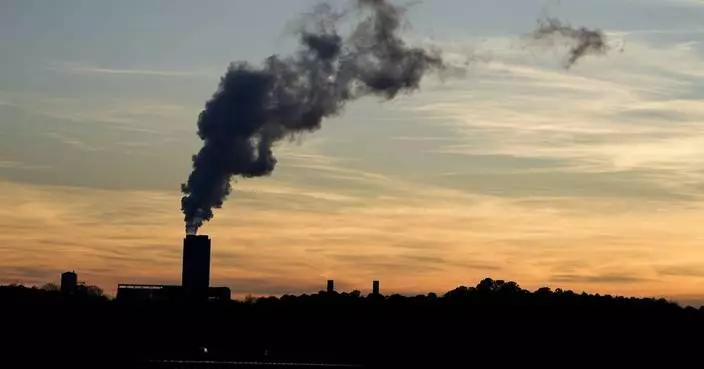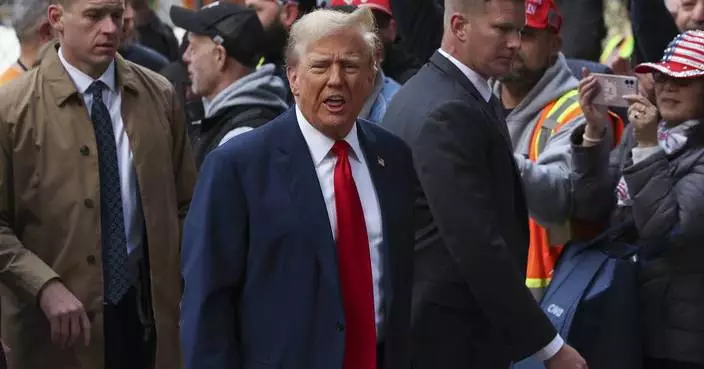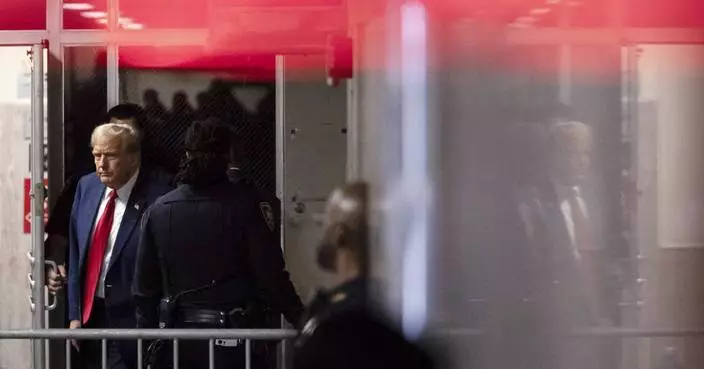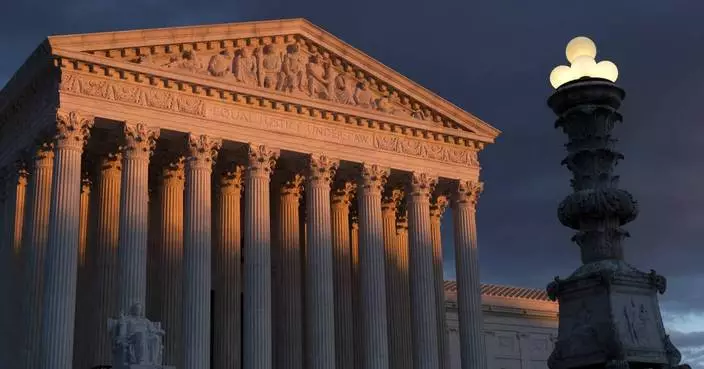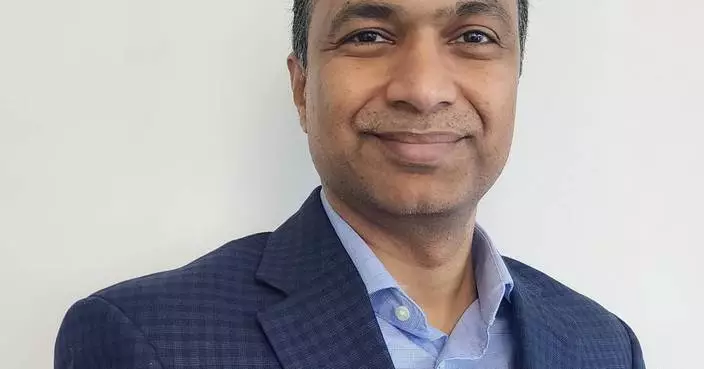A tabloid magazine held back from publishing an adult film star's 2011 account of an alleged affair with Donald Trump after the future president's personal lawyer threatened to sue, four former employees of the tabloid's publisher told The Associated Press.
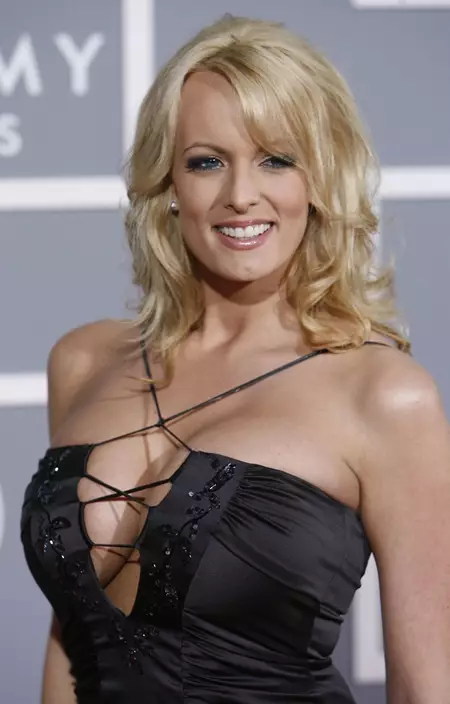
FILE - In this Feb. 11, 2007 file photo, Stormy Daniels arrives for the 49th Annual Grammy Awards in Los Angeles. (AP Photo/Matt Sayles)
In Touch magazine published its 5,000-word interview with the pornographic actor Stormy Daniels on Friday — more than six years after Trump's long-time attorney, Michael Cohen, sent an email to In Touch's general counsel saying Trump would aggressively pursue legal action if the story was printed, according to emails described to the AP by the former employees.
At the time, Trump was a reality TV star on the NBC show "The Apprentice."
The ex-employees spoke to the AP on condition of anonymity because they were not permitted to discuss their former employer's editorial policies.
Daniels, whose real name is Stephanie Clifford, signed a source contract with the magazine, which said a friend and Clifford's ex-husband corroborated her account of a 2006 tryst. She also passed a lie detector test, the magazine said.
In the interview, Daniels claims she and Trump had a sexual encounter after meeting at a golf tournament in Lake Tahoe, Nevada, a year after Trump's marriage to his third wife, Melania.
Cohen has denied Trump had any relationship with Clifford. He didn't immediately return a message seeking comment Friday.
Last week, The Wall Street Journal reported that Cohen brokered a $130,000 payment to Daniels in October 2016 to prohibit her from publicly discussing the alleged affair before the presidential election. Other news organizations have since reported Clifford was in discussions with them about telling her story.
Cohen hasn't addressed his role negotiating the supposed payment, but provided the Journal a statement from "Stormy Daniels" in which she denied receiving any "hush money" from Trump.
A lawyer for Clifford, Keith Davidson, didn't return an email message seeking comment. In the statement provided by Cohen, Clifford called allegations of a sexual relationship with Trump "completely false."
It wasn't immediately clear why the magazine didn't publish its interview during the 2016 presidential campaign despite reminders from former employees that the transcript was still available in the company's networks, two former employees said.
A spokeswoman for In Touch, which is published by Bauer Media Group, claimed it only learned of its earlier interview after the Journal's report last week. She wouldn't comment on the magazine's decision not to publish in 2011.
Despite Clifford's first-person details on Trump, former employees said the decision not to run the story in 2011 was a justifiable business decision because at the time because Trump didn't have the same star appeal as more famous celebrities.
Cohen emailed In Touch's general counsel, Greg Welch, threatening to sue over the story in October 2011 — the same day Clifford's attorney sent a similar letter to Los Angeles-based blogger Nik Richie, who first posted Clifford's allegations to his website, The Dirty, according to emails provided by Richie.
WASHINGTON (AP) — The U.S. Supreme Court on Thursday took up Donald Trump's bid to avoid prosecution over his efforts to overturn his 2020 election loss to Democrat Joe Biden.
Trump’s lawyers argue that former presidents are entitled to absolute immunity for their official acts. Otherwise, they say, politically motivated prosecutions of former occupants of the Oval Office would become routine and presidents couldn’t function as the commander in chief if they had to worry about criminal charges.
Lower courts have rejected those arguments, including a unanimous three-judge panel on an appeals court in Washington. And even if the high court resoundingly follows suit, the timing of its decision may be as important as the outcome.
That’s because Trump, the presumptive 2024 Republican presidential nominee, has been pushing to delay the trial until after the November election, and the later the justices issue their decision, the more likely he is to succeed.
The court typically issues its last opinions by the end of June, which is roughly four months before the election.
Currently:
What to listen for during Supreme Court arguments on Donald Trump and presidential immunity
The Supreme Court will decide whether Trump is immune from federal prosecution. Here’s what’s next
What to know in the Supreme Court case about immunity for former President Trump
Trump is in New York for the hush money trial while the Supreme Court hears his immunity case in DC
Follow the AP’s coverage of the U.S. Supreme Court at https://apnews.com/hub/us-supreme-court
Here's the latest:
Supreme Court Justice Clarence Thomas pressed Donald Trump's lawyer D. John Sauer at the outset of arguments Thursday, asking where the principle of absolute immunity comes from.
The question was the first during arguments at the Supreme Court in Trump’s bid to avoid prosecution over his efforts to overturn his 2020 election loss to Democrat Joe Biden.
Sauer fell back quickly on a Supreme Court case that’s core to the defense — a 1982 decision that held that former presidents are immune from civil lawsuits.
A skeptical Justice Sonia Sotomayor pointedly noted to Sauer that the indictment alleges that Trump acted for personal gain.
She said the Founding Fathers had contemplated the idea of immunity for presidents but had explicitly decided against it.
She made clear her opposition to the Trump legal team’s position, saying she was having a hard time envisioning immunity for a president who creates and submits false documents, orders the assassination of a political rival, and any number of other criminal acts.
First up on Thursday was D. John Sauer, making Donald Trump’s argument that he’s immune from criminal prosecution. A former Missouri solicitor general and onetime Supreme Court clerk, Sauer also represented Trump at the appeals court level.
Trump went to those arguments even though he wasn’t required to be there, but he won’t be in the audience at the Supreme Court today. He’s required to be in New York for his hush money trial.
About 30 demonstrators gathered outside the Supreme Court before arguments, some wearing judicial robes with kangaroo masks and others holding signs like “Justice Delayed Is Justice Denied.” That’s an apparent reference to the the timing of the high court’s ultimate decision in the case, which could determine whether a trial can be held before the election in November.
Shortly before arguments were slated to begin, Trump fired off a few posts Thursday on his social media network.
In one, he declared in all caps, “WITHOUT PRESIDENTIAL IMMUNITY, IT WOULD BE IMPOSSIBLE FOR A PRESIDENT TO PROPERLY FUNCTION, PUTTING THE UNITED STATES OF AMERICA IN GREAT AND EVERLASTING DANGER!”
Trump also said that without immunity, a president would just be “ceremonial” and the opposing political party “can extort and blackmail the President by saying that, ‘if you don’t give us everything we want, we will Indict you for things you did while in Office,’ even if everything done was totally Legal and Appropriate.”
Of the nine justices hearing the case, three were nominated by Trump — Amy Coney Barrett, Neil Gorsuch and Brett Kavanaugh. But it’s the presence of a justice confirmed decades before Trump’s presidency, Justice Clarence Thomas, that’s generated the most controversy.
Thomas’s wife, Ginni Thomas, urged the reversal of the 2020 election results and then attended the rally that preceded the Capitol riot. That has prompted calls for the justice to step aside from several court cases involving Trump and Jan. 6.
But Thomas has ignored the calls, taking part in the unanimous court decision that found states cannot kick Trump off the ballot as well as last week’s arguments over whether prosecutors can use a particular obstruction charge against Capitol riot defendants.
The justices will probably meet in private a short time after arguments to take a preliminary vote on the outcome. Chief Justice John Roberts would be a prime candidate to take on the opinion for the court, assuming he is in the majority.
They could simply reject Trump’s immunity claim outright, permitting the prosecution to move forward and returning the case to U.S. District Judge Tanya Chutkan to set a trial date.
They could also reverse the lower courts by declaring for the first time that former presidents may not be prosecuted for conduct related to official acts during their time in office. Such a decision would stop the prosecution in its tracks.
There are other options, too, including ruling that former presidents do retain some immunity for their official actions but that, wherever that line is drawn, Trump’s actions fall way beyond it.
Yet another possibility is that the court sends the case back to Chutkan with an assignment to decide whether the actions Trump is alleged to have taken to stay in power constitute official acts.
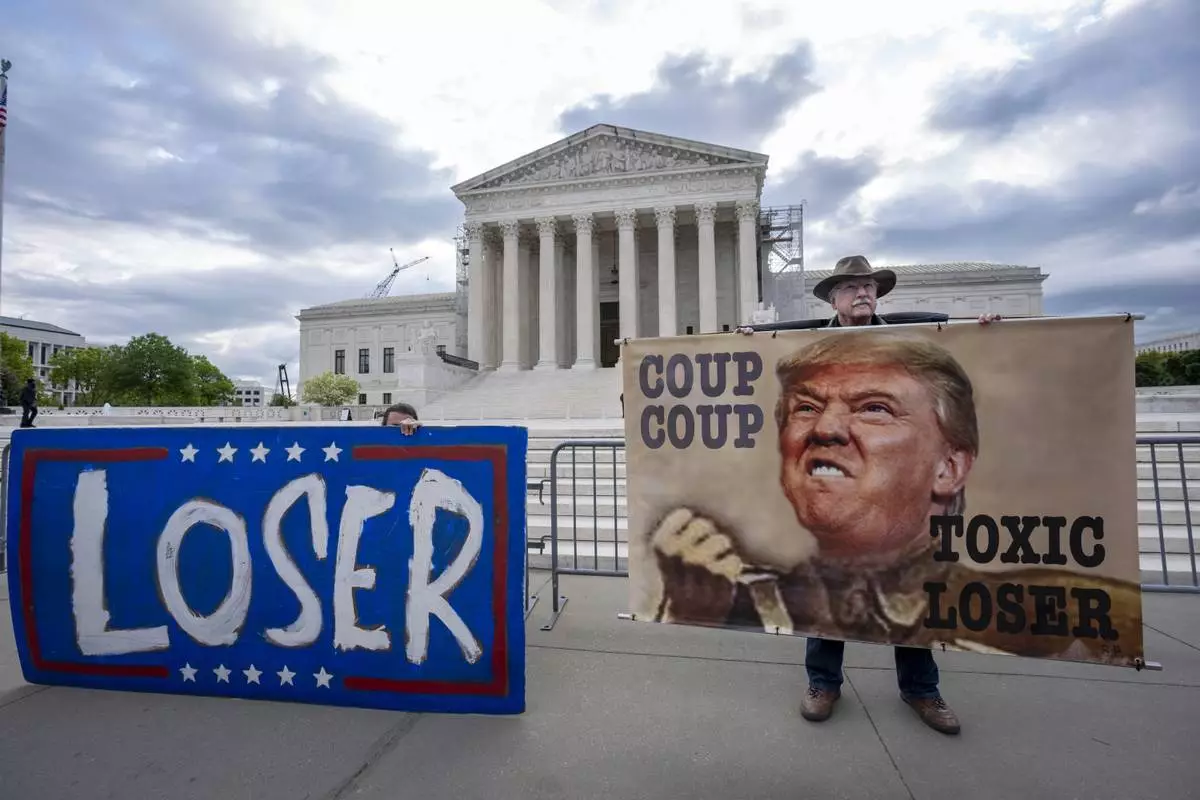
Activist Stephen Parlato of Boulder, Colo., right, joins other protesters outside the Supreme Court as the justices prepare to hear arguments over whether Donald Trump is immune from prosecution in a case charging him with plotting to overturn the results of the 2020 presidential election, on Capitol Hill in Washington, Thursday, April 25, 2024. (AP Photo/J. Scott Applewhite)





